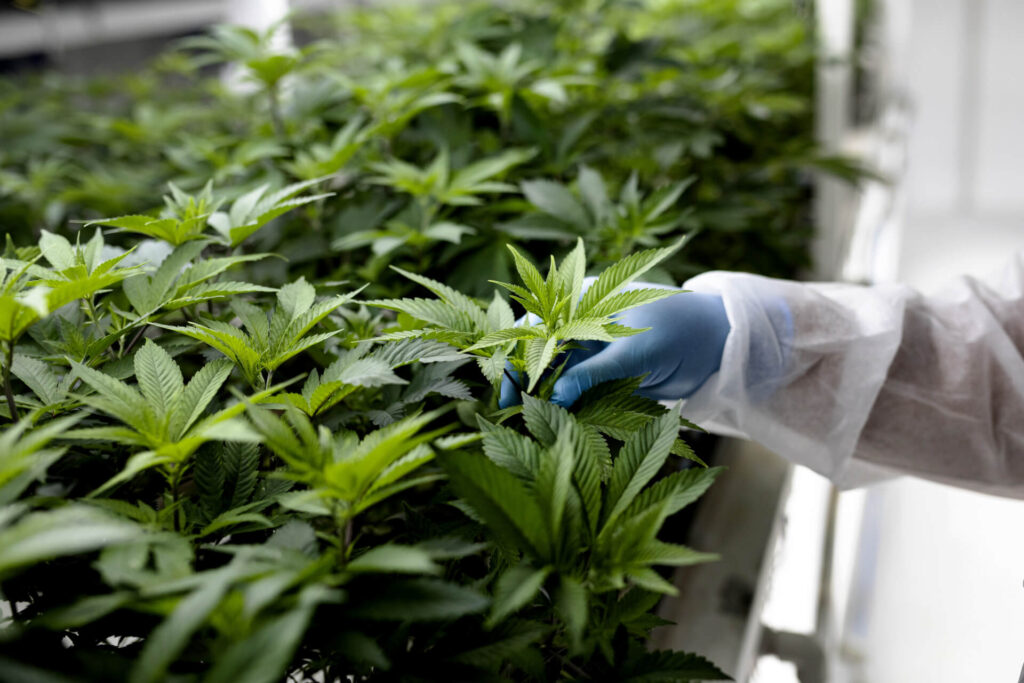
Legislative leaders have stated they’re dedicated to putting a hashish legalization referendum on the November poll, and recent polling suggests it can cross by a snug margin.
However some supporters of marijuana reform warned on Monday that the legislature’s present plan for legalizing possession of small quantities of marijuana may trigger confusion for the general public and regulation enforcement officers.
The Home of Delegates is contemplating two measures — House Bill 1, which might set up a referendum this November, and House Bill 837, which might create a regulatory framework for a marijuana trade. As at the moment drafted, the second invoice wouldn’t take impact till July 1, 2023.
If authorized, possession of as much as 1.5 ounces of marijuana would grow to be authorized and folks serving time solely for possession of small quantities of pot can be free of jail with their information expunged.
Reform advocates applaud the laws, however they expressed concern in regards to the eight-month hole between a headline-generating referendum and the date the brand new regulation takes impact.
They level to New Jersey, the place voters authorized a referendum by a 2-to-1 margin in November 2020. Observe-on legislative motion didn’t come till months later. In that intervening period, 6,000 Backyard State residents had been charged with minor marijuana possession, in line with a report from the state judiciary.
“We’re in a horrible limbo,” stated Chris Goldstein, of the hashish activist group NORML, stated throughout the interim. “I believe the confusion — the damaging confusion — isn’t amongst shoppers. I believe there’s a harmful confusion among the many police and prosecutors on the market. The issue is police are nonetheless implementing prohibition. I believe they want a clearer directive.”
Olivia Naugle, a senior coverage analyst on the Washington, D.C.-based Marijuana Coverage Challenge, instructed the Home Judiciary Committee on Monday that Maryland ought to be taught from New Jersey’s expertise.
“This delay would imply hundreds of Marylanders — disproportionately Black Marylanders — would continued to be subjected to police interactions and citations for hashish for eight months after voters undertake legalization,” she stated. “These are police interactions and citations for hashish which might be traumatic, are disproportionately focused to individuals of colour and at their worst might be lethal for individuals of colour.”
Naugle stated that legalizing possession instantly after a profitable referendum is “a greater coverage alternative.”
Within the months since Home Speaker Adrienne A. Jones (D-Baltimore County) introduced her assist for a referendum, the leaders of a number of committees have labored on the difficulty. They wish to be sure that Maryland’s doubtlessly profitable marijuana trade is racially various they usually wish to be sure that the state has baseline knowledge to trace the well being and public security impacts of legalization.
Senate leaders additionally assist legalization. Lawmakers in each chambers are desperate to deliver an finish to enforcement practices which have impacted Black customers greater than individuals of different races.
However the query of timing has precipitated friction between the Home and Senate.
At Monday’s listening to, Home Majority Chief Eric Luedtke (D-Montgomery), a member of the Methods and Means Committee, stated Jones’ instruction to her committee chairs is to craft strong payments.
“The potential legalization of leisure hashish, ought to the voters approve a poll query within the fall, is an amazing financial improvement alternative,” he stated. “It’s extra essential that we get it carried out proper than that we get it carried out rapidly.”
Home Financial Issues Committee Chair C.T. Wilson (D-Charles) stated it’s important for the state to complete a disparity research whether it is to understand the objective of getting entrepreneurs of colour among the many gamers within the new trade.
“If we’re tricked into speeding ahead, then we are going to miss out on this multi-billion greenback trade, the place lower than two p.c of the participation is completed by minorities,” he stated. His use of the time period “speeding” was an obvious reference to the Senate, the place leaders have advocated a speedier timeline.
“We’re not going to go away our individuals behind,” stated Wilson, who’s Black, noting that the laws units up a small, minority-owned and women-owned enterprise help fund. “My objective isn’t just to create Black jobs, minority jobs, however to create Black millionaires. … We is not going to be rushed.”
Eighteen states, together with Virginia, and the District of Columbia have legalized the non-medical use of marijuana.
Home Judiciary Vice-Chair David Moon (D-Montgomery), a longtime reform proponent, urged fast adoption of latest legal guidelines.
“Yearly that marijuana has been unlawful in Maryland… no less than 30,000 legal expenses had been filed in opposition to our residents, even after decriminalization of small quantities in 2014,” he stated. “And naturally, all of the survey knowledge signifies that that’s disproportionately Black Marylanders and different individuals of colour though we all know the use charges… are the identical.”
A number of reform advocates urged lawmakers so as to add a provision banning police from conducting a search of an individual or automobile primarily based solely on the odor of pot.
“As soon as we push hashish into the authorized stream of commerce, it may possibly’t be lawful and authorized… and be possible trigger on the similar time,” stated Deputy Prince George’s County State’s Lawyer Perry Paylor. “Fairly frankly, it’s complicated. It’s complicated to the police. It’s complicated to the bench [judges], and sadly it’s complicated to the tip customers as effectively.”















